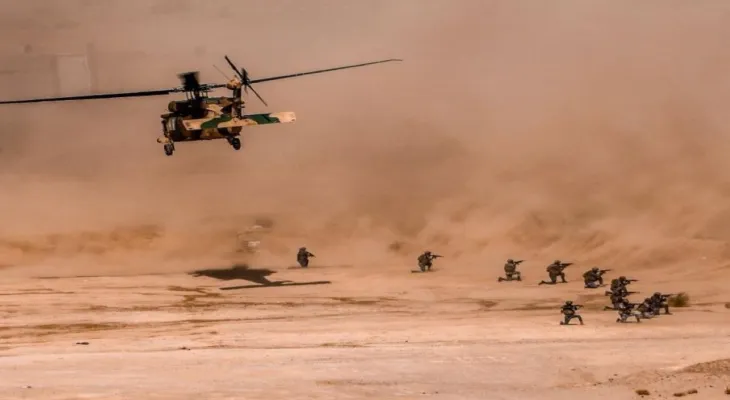Search here
Newspaper
Search here

Arab Canada News
News

Published: April 13, 2024
With Iran beginning to carry out its threats against Israel regarding the "Revolutionary Guard" seizing a ship it claims is linked to Tel Aviv, Jordan remains on high alert for fears that it may be affected by the consequences of this new crisis in one way or another.
After a long absence, attempts at infiltration and breaching the Jordanian borders from Syria returned on Friday, raising concerns in Amman about the entry of Iran-aligned militia members to carry out military operations against Israel from the kingdom's territory.
The Jordanian army announced the killing of two individuals after clashing with them during an infiltration and smuggling operation in the south of the country. Over the past years, Jordan has thwarted hundreds of attempts at infiltration and smuggling from Syria and Iraq.
On April 2, the Iraqi "Hezbollah Brigades," aligned with Iran, spoke about preparing weapons and anti-armor launchers and tactical missiles for "fighters in Jordan" under the name "Resistance in Jordan" to support Palestinians in Gaza, which heightened concerns for the kingdom.
Jordanian Concerns
In a report released hours ago, the American newspaper "Financial Times" stated that Washington has informed its allies in the region, including Jordan, that an Iranian retaliation against Israel may be imminent.
Jordanian fears are based on several reasons, primarily the presence of American forces and bases on its territory under the "Joint Defense Agreement" with Washington signed in 2021 and the potential involvement of these forces in countering Iranian escalation, which means they could be targeted on Jordanian soil.
Estimates indicate the presence of about 3,000 American soldiers in the kingdom, and Jordan fears that its lands and skies may turn into a battleground for military retaliations, especially since many Iranian drones and missiles have fallen on Jordanian territory more than once.
In January, three American soldiers were killed and others injured in a drone attack on a military site in Jordan called "Tower 22."
Then, in March, the Jordanian armed forces announced the opening of an investigation after parts of a drone were found in Irbid Governorate in the north of the country following reports of hearing an explosion in the area, without any damage occurring.
According to cybersecurity expert Majdi Qbailin, Israel has been concerned about an Iranian response from the air, which has led it to jam GPS systems in recent days in anticipation of drones and missile threats.
He said, "After collecting data from the 'Google Traffic' feature and information on jamming GPS signals from the 'GPS Jam' system, it became clear that the deliberate jamming executed by Israel on GPS and 'GLONASS' system signals is a key factor in the massive traffic congestion within the kingdom, significantly affecting the navigation systems used in phones within Amman by delivery companies and applications, as well as visitors to the capital from outside the provinces."
The Israeli newspaper "Haaretz" reported that "in recent days, threats from drones have increased, and several have infiltrated Israel from Jordan, striking the naval base in Eilat and crashing near the border with Jordan."
A Message to Tehran
In a preemptive message, Jordanian government sources told "Independent Arabia" that Amman has informed Tehran through diplomatic channels that it will defend its borders if they are exploited militarily amid the current crisis, emphasizing that it will not allow them to turn into a theater for military operations.
Observers confirmed that the Jordanian government has activated the National Center for Security and Crisis Management, intensifying its monitoring of the activities of any individuals or movements aligned with Tehran or what is known as the "Axis of Resistance," that may be present on the kingdom's territory.
However, writer and analyst Maher Abu Tar reduced fears of a regional war and its implications for Jordan, clarifying that since the "Arab Spring," Israel has been targeting Iran through various means, and despite all these previous attacks through different methods, Tehran has not escalated its responses beyond what was expected.
He clarified that Iran itself does not want to enter a regional war and is trying to avoid it by all means for its internal considerations, especially since this scenario seemed possible at the beginning of the Gaza war but has gradually receded.
Developing the Defense System
In anticipation of this regional confrontation, Jordan has been requesting its ally the United States for months to provide it with advanced radar systems and air defense systems and drones.
In 2023, Amman requested Washington to supply it with "Patriot" missiles to enhance the country's defensive system. Brigadier General Mustafa al-Hayyari, Director of Military Media in the Jordanian Armed Forces, attributed this to the ongoing threats represented by ballistic missiles surrounding the kingdom from the northern, eastern, and western directions.
Jordan has also requested equipment to monitor drones, which pose the biggest security challenge for it, as Iran-aligned factions inside Iraq and Syria have successfully breached Jordanian airspace via drones heading toward Israel multiple times without being intercepted.
Jordan's task of maintaining distance from the volatile region is becoming difficult these days if Israel and Iran begin to exchange missile strikes.
Among the scenarios feared by Jordanian observers is that Israel might enter Jordanian territory in one way or another to confront and strike Iran and that both sides do not limit themselves to exchanges of fire from a distance.
Comments